|
R. L. "Pete" Somerville
Pre-flight training at Lee Field near Jacksonville, Florida
-1942. Front Row: L-R: Pete Somerville, __, and __.
Back row L-R: Ed Rasch, Hersch Pahl, Bickford White, Kelly,
John Carr, Bobby Neel, Edwin Nelson, Joe Robbins and Billy Barnett.
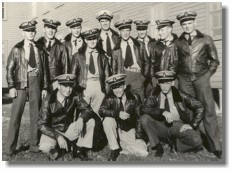 |
R. L. "Pete" Somerville came from Chillicothe, MO. We were both going through E Base (elimination
flight Training) at Fairfax, Kansas in the spring of 1942.
In early summer we both moved on to Jacksonville, Florida where we progressed through the ground
school and the various stages of fight training. Most of the time we were in adjacent classes; however, when we
entered pre-operational flight training at Lee Field we were in the same flight and saw quite a bit of each other.
He had been selected as a dive-bomber trainee and I had been selected for the fighter training. Four other guys
in our flight were destined to be torpedo pilots.

R.L. "Pete" Somerville
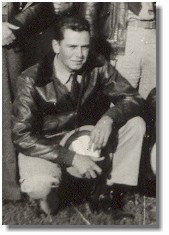 |
|
|
Hatless Photo of Pre-flight Training
at Lee Field, near Jacksonville, Florida, 1942 - Front
Row: L-R: Pete Somerville, __, and __. Back row L-R: Ed Rasch, Hersch Pahl, Bickford White, Kelly, John Carr, Bobby
Neel, Edwin Nelson, Joe Robbins and Billy Barnett.
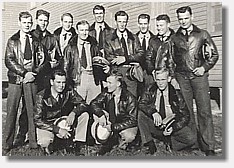 |
|

The next phase of training took us to Cecil Field, just west of Jacksonville. Here we underwent operational
training using current fleet aircraft.
We did not see much of each other then until we checked into the re-forming fleet squadrons in San
Diego - all in the same air group. Again we were in adjacent squadrons and flying different type aircraft. We knew
that we were to be deployed together, which gave us reason to keep an eye on each other.
During "Operation Galvanic*", November 1943, when "Butch" O'Hare was lost, Pete was on the USS Enterprise (CV-6) with
VB-6 while I was near by with Air Group 25 aboard the USS Cowpens (CVL-25). Pete received a good taste of combat at that time and had also
participated in the December 4th raid on Kwajalein before the whole Air Group Six got back together aboard the
USS Intrepid for "Operation Flintlock" in the Marshall Islands and then for a raid on Truk in February, 1944.
After that, Pete and I did not see much of each other until we were together again aboard the USS Hancock (CV-19) in March
of 1945, both in Air Group Six.
On 29th of March, my division of Hellcats were launched predawn to provide a combat air patrol over
a radar picket a hundred of more miles north west of the fleet, while a big raid of dive-bombers escorted by fighters
were sent to hit military targets in Kagoshima Bay, which was a bit north and east of where I was.
While circling over the radar picket, I listened to the attack being made at Kagoshima.
Soon I learned that a dive-bomber experienced difficulties and had gone into the water in Kagoshima
Bay. A rescue operation was soon in progress.
I suggested that my division be sent to go to Kagoshima Bay to give protective coverage; however
we had already been airborne 3 or 4 hours and didn't have enough fuel to take us through any air to air combat
if it should be necessary. Rather than send us, they elected to launch a fresh division of fighters with a full
load of fuel.
A division of four Hellcats lead by Robert L. "Cherry" Klingler with Roland H. Baker, Willis H. Moeller
and Louis
L. "Louie" Davis were sent to defend
and help rescue the man in the water. That man was none other than "Pete" Somerville.
They located Pete in his raft easily as it was marked by a dye marker; however, soon after they arrived,
Pete was treated to an exciting air show as he witnessed a "dog-fight" between what seemed like a sky-full
of Japanese and American fighter planes directly over-head.
The Japanese planes had spotted the life raft and were approaching when the fight started. Klingler's
division tore into them and the melee started with both sides shooting and doing their offensive and defensive
maneuvering.
That flight of enemy fighter planes seemed to be after the man in the life raft. Pete witnessed a
lot of shooting going on right overhead while he laid back in his raft and watched it all. He was afraid that the
winner was going to get him as a prize.
Within a very short time, five enemy planes had been shot down. Unfortunately, while Louie Davis
was firing at one plane, another enemy plane was seen chasing and shooting at him. When it was all over Louie was
missing. He had obviously lost his life while defending the man in the life raft.
Pete, while in his life raft, observed a Japanese pilot descending in his parachute.
Anticipating the beginning of the first battle of Japanese inland waters (Kagoshima Bay), Pete checked
out his trusty .38 pistol, blew the water out of it and prepared to repel boarders. Pete could imagine that guy
swimming under water with his knife in his teeth. It was exciting; however, Pete did not see the enemy again, so
he did not have to repel boarders after all.
While Pete was being rescued by a float plane from one of our cruisers, Cliff Seaver and his wing-man,
Jerry Hoveland, shot down two more enemy aircraft in the vicinity of the rescue operation.
Pete was flown back to the cruiser and was transferred to the Hancock the next morning. Pete was
wearing his usual ear to ear grin and was proudly telling about the rescue and about the "Battle of Kagoshima
Bay", which did not materialize.

Photo courtesy of Peter M. Somerville of Vienna, Va.
 |

Years later in 1986, Judge R.L. Somerville retired from the "Bench" in Kansas City where
he had served many years on the Missouri court of Appeals. Unfortunately, the long planned canoe and fishing trip
with Hersch Pahl in Southern Missouri did not take place as Pete encountered fatal heart problems shortly after
his retirement.
This dedication is made not only to my shipmate, Pete Somerville, but also to Louie Davis who lost his life in Pete's defense, and to Pete's gunner, Louis F. Jakubec, ARM2c who did not
survive, when his dive bomber was shot down over Kagoshima Bay.
This dedication is also made to the pilots who worked as a team in defending and helping save Ol'
Pete Somerville: Robert
L. "Cherry" Klingler, Willis H.
Moeller, Roland H. Baker , Clifford N. Seaver, Jerome
O. "Jerry" Hoveland and others, including the float plane pilot.
The rest of the story was revealed to me by mail after I asked Pete to give me his story to include
in my book "POINT
OPTION" - he basically confirmed my
version of his accident and rescue story; however he went further to tell about the accident itself:
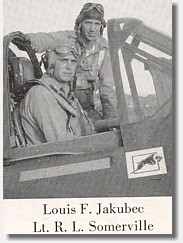 |
"After pulling out of
my dive, I flew out into the Bay, waiting for the rest of the planes to join up on me. Suddenly my plane (SB2C)* went completely
out of control. At the time, I did not know what had happened nor even suspected another plane had been involved.
I do not know exactly what my altitude was at the time, but I do remember my plane went into a violent flat spin,
and I still had no idea the plane's tail had been cut off. The rudder pedals were flopping back and forth and I
had no elevator or rudder control. I repeatedly called Jakubec, my rear seat gunner, over the intercom, but never
did make contact with him. I don't know, to this day, whether he was thrown from the plane or whether he had been
fatally injured. When my plane had descended to approximately 800 feet, it was still in a violent, flat spin, and
I still had no idea the plane's tail had been cut off. I did, however, realize that we were going to have to bail
out. I quickly concluded that if he was still alive, he too, surely knew the plane was going to crash and that
he should get out.
"My chute just barely had time to open before I hit the water at high
speed.
"While the chute was in the process of opening, my feet and legs had become tangled in the risers.
This caused me to contact the water on my head and right shoulder. The impact was so great, I was temporarily rendered
unconscious.
"After I regained consciousness, I cut myself free with my knife, and then climbed into my small rubber
raft. I was near the center of Kagoshima Bay, three miles from either shore and about 15 miles from the mouth of
the bay. I found that I had to paddle briskly to keep from drifting to the east shore where I could see people
moving about."
- Pete Somerville
*See History of Pete's Dive Bomber, the SB2C
Helldiver Here

IN MEMORIAM
|
R.L. "Pete" Somerville
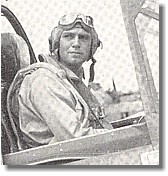 |
|
Louis L. "Louie" Davis
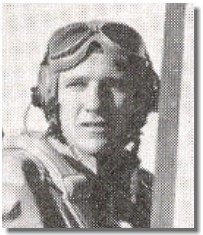 |
|
Gunner
Louis F. Jakubec
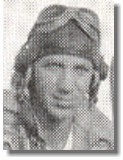 |
|

* Operation Galvanic is also mentioned on the following
pages. Use your 'Back Button' or 'Return' Button at bottom of the page to return here.
- Tom Hall Dedication
- Robert
"Moose" Merritt
- Things of Interest - Play by Play Reporting
"For those who fought for it...
freedom has a flavor the protected will never know!"
|